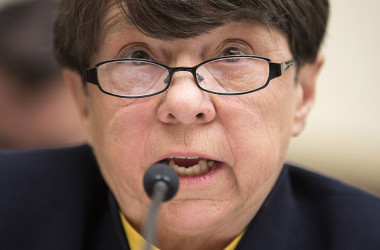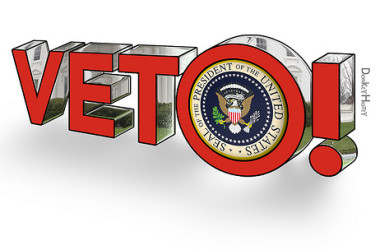
SEC Preparing to Finalize Transparency Rules for “Polluted” Dark Pools, Mary Jo White Says
Agency could alter 2015 proposal, which sought to pull back the curtain on opaque trading venues
In what might be her last major speech to members of the broker-dealer community as the Obama administration winds down and gets ready for the closing bell, SEC Chair Mary Joe White addressed a Washington DC gathering of the Securities Traders Association this week and talked about BDs favorite topic: equities market structure. After taking a few accolades for approving Finra-recommended regulations that require software developers of algorithmic trading tools to be registered and licensed just as securities traders, Ms White summarized her accomplishments and forward looking perspectives regarding SEC efforts to address inequities in the equities market structure.
Courtesy of Mondo Visione, below are the opening extracts from Ms. White’s speech:
Thank you, Jim [Toes], for that kind introduction. I am honored to join you again for your annual market structure conference.
The American equity markets are the strongest in the world, and one of the Commission’s most important responsibilities is to work every day to maintain their fairness, orderliness, and efficiency. Optimizing market structure is a continuous process, one that requires the Commission to act with both care and intensity, strictly guided by what is best for investors and capital formation for public companies.
I emphasized this guiding principle when I last joined you in 2013,[1] and in 2014 when I laid out a program for enhancing equity market structure.[2] Fulfilling our responsibility to investors and issuers, of course, demands that the Commission act quickly to address issues that are demonstrably undermining the interests of investors and issuers. But it also requires the Commission to carefully consider changes to market structure where the impact on those interests is far less clear and the data to support competing perspectives is lacking or conflicting.
Where improvements to equity market structure are clearly called for, the Commission has acted. The operational integrity of our markets – my top priority – has been significantly enhanced by a number of measures. The staff is gathering and analyzing more market data than ever before to inform policymaking, and the consolidated audit trail is becoming reality. And we have detailed proposals out for comment that will give investors more transparency into how the off-exchange markets operate and broker-dealers handle their orders.
At the same time, the Commission has undertaken a deliberate, data-driven process to assess – and, as appropriate, begun to implement – more fundamental changes to equity market structure. This process requires great care. The American equity markets today continue to serve well the interests of retail and institutional investors, delivering better executions at lower costs than ever before. Broad changes to this market structure – especially those executed precipitously or without adequate data – can have serious unintended consequences for investors and issuers as their impact is fully realized, sometimes years down the road.
This two-pronged approach recognizes that market structure can never be perfect and, correspondingly, that the Commission’s work is never – and should never – be done.[3] Market structure is continually evolving as technology and competition spur innovation. That fluidity means that the Commission’s review must be both comprehensive and nimble, constantly testing existing assumptions, regulations, and market practices, while remaining poised to act quickly on issues that immediate attention can address.
Today, I want to report on some of our progress on both our targeted enhancements to tackle such issues, and our consideration of more fundamental market structure questions. While the Commission has been active in a number of areas, I will focus today on operational integrity, market transparency, and algorithmic trading.
In assessing these areas and others, we have been fortunate to have the assistance of our relatively new Equity Market Structure Advisory Committee, or EMSAC. Especially in addressing some of the more complex issues in market structure today, the EMSAC, which brings deep expertise and a wide range of perspectives, provides a public forum for valuable and timely discussions, both within the Committee itself and as a result of its efforts to reach out to a wide range of others with expertise on key issues.
Strengthening Operational Integrity and Market Stability
Let me begin where I always do, with operational integrity and market stability. Since I arrived at the Commission, enhancing the reliability and resilience of our markets has been my top priority. Weaknesses or disruptions in operations can destabilize markets and, in some cases, lead to extreme price volatility and the loss of investor confidence. The Commission’s work here continues – we can never be complacent – but I am very pleased with the steps we have taken to strengthen the market systems on which investors depend every day.
Regulation SCI
Central to this effort has been Regulation SCI, which the Commission adopted at the end of 2014.[4] While no measure can eliminate technology disruptions altogether, Regulation SCI is designed to reduce the occurrence of systems issues and to improve resilience and communication when systems problems do occur. It imposes requirements on key market participants – the exchanges, high‑volume alternative trading systems (ATSs), clearing agencies, the securities information processors (SIPs), the Financial Industry Regulatory Authority (FINRA), and the Municipal Securities Rulemaking Board (MSRB).
These “SCI entities” were required to start complying with most of the requirements of Regulation SCI last November.[5] In the first instance, this means maintaining comprehensive policies and procedures to ensure the capacity, integrity, resiliency, availability, and security of key automated systems. It also means: taking appropriate corrective action when systems issues happen; reporting systems problems and changes directly to the Commission and market participants; and conducting periodic reviews and testing of automated systems.
Approaching the first full year of the regulation’s operation, our examiners have been reviewing compliance with Regulation SCI. It is apparent from these examinations that many market participants have devoted significant resources to compliance, and there has been good progress in implementation. But a few areas for additional attention have emerged. For example, it is clear that processes for patching and updating systems deserve close attention – human errors in these routine tasks can create much more significant issues. Another example is diversifying primary and backup systems – in seeking to fulfill their recovery obligations under Regulation SCI, market participants should focus on not just the geographic locations of those systems, but also consider their reliance on different electrical, telecommunications, and other infrastructure support. Our staff is continuing to work with market participants in these areas and others to help ensure that the goals of Regulation SCI are achieved.
Improvements to Critical Market Infrastructure
Regulation SCI has been complemented by a number of initiatives by the exchanges and FINRA to enhance the operational integrity of critical market infrastructure like the SIPs and the open/close process. At my direction, following the Nasdaq SIP outage in 2013 and NYSE’s trading outage in 2015, SEC staff worked with the exchanges and FINRA to correct the defects that caused these incidents, as well as to identify and address other potential single points of failure. These cooperative efforts were expanded after the unusual volatility of August 24, 2015, and there has been significant progress.
- First, the resilience of the SIPs is considerably improved. There are now enhanced disaster recovery sites and systems to establish a “hot/warm” backup process, which provides for a failover from the primary site to the backup site in ten minutes or less.[6]
- Second, as of June, the equity listing exchanges now have mutual backup arrangements for their closing auctions, which will address situations when a disruption might prevent the execution of a closing auction on the primary listing exchange.[7]
- And third, the process for opening auctions, especially in volatile markets, has been and continues to be improved.[8]
Enhancements to Volatility Moderators
Amidst these and other improvements,[9] reminders persist about the continued importance of the volatility moderators implemented after the “Flash Crash,” especially the “limit-up/limit-down” plan designed to reduce extraordinary volatility in individual securities. The exchanges and FINRA have already implemented basic enhancements to limit-up/limit-down in the wake of the events of August 24, 2015,[10] and I have asked them to address additional issues that emerged during that event.
Further Strengthening Market Operations
One such issue is the application of the mechanism to exchange-traded products (ETPs), where we have a broader program underway to help ensure that these increasingly popular products operate robustly in a variety of market conditions. We saw during the Flash Crash and on August 24 that ETPs can be disproportionately affected when markets become disorderly. Orderly trading in an ETP requires a smoothly functioning market for the ETP’s holdings so that market makers and authorized participants can reliably value the ETP’s portfolio. If the underlying market becomes disorderly, or if market makers and authorized participants step away from trading, the arbitrage mechanism can be disrupted and an ETP can trade at prices substantially away from its implied value.
Commission staff, as well as the exchanges and FINRA, are assessing the special characteristics of ETP trading in determining whether particular changes should be made to the limit-up/limit-down mechanism to reflect the sensitivity of ETPs to disorderly market activity.[11] In addition, I have directed the staff’s ETP Working Group to identify and analyze a broad range of issues relating to the structure, trading, and use of ETPs. The Working Group is considering, among other things: what portfolio characteristics and market structures support effective arbitrage; the roles and practices of market makers and authorized participants; and the effects of the ongoing exchange pilot programs to incentivize trading in less‑liquid ETPs.
If you haven’t already fallen asleep and would like to read the entire transcript, please click here







